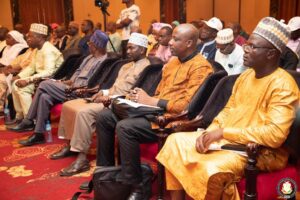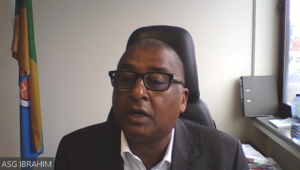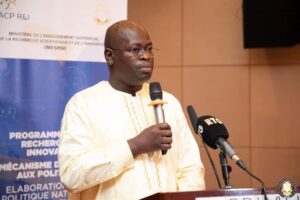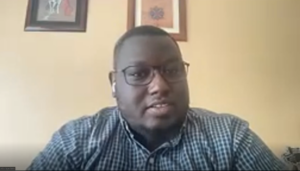At the final event of the PSF service in Guinea, held on 28 July 2023, a country background report and a policy recommendation report were submitted to the Guinean government for developing a national policy and making research and innovation (R&I) as an accelerator of sustainable development.
Around 60 participants- many key stakeholders of the national R&I system, as well as representatives of international organisations- attended on 28 July 2023 in a hybrid mode (in Conakry and online) the closing ceremony of the PSF service in Guinea, requested by the Ministry of Research, Science and Innovation (MESRSI) and implemented by the Organisation of African, Caribbean and Pacific States (OACPS), with funding from the European Union (EU). This PSF service in Guinea started in December 2022.

Dr. Norbert Ibrahim Richard, Assistant Secretary General of the OACPS, recalled the hard work of the national and international experts, who met with more than 500 R&I players throughout the country and also underlined the unprecedented level of engagement shown by the Guinean authorities, starting with MESRSI. He stressed the need for ownership of the documents produced. “The country is at a turning point, where the broad outlines of tomorrow’s development can be drawn up, on the basis of judicious management of research and innovation, and better valorisation of the results. Everyone must be able to play their part in this joint undertaking. Researchers, political decision-makers, business leaders and members of civil society… There can be no good national research and innovation policy unless you all take ownership of the issues it sets out to address and the solutions it recommends.

(Dr. Norbert Ibrahim Richard)
Referring to the highly inclusive and holistic field mission, which made it possible to meet the main players in the R&I ecosystem, with a view to producing recommendations capable of having a positive impact on the socio-economic level and providing concrete solutions to complex challenges, Ms. Simona Mari, R&I Senior Expert at the European Commission’s Directorate-General for International Partnerships, stressed the importance of future reforms and prioritisation. “Reforms will be needed to ensure better popularisation and valorisation of scientific results, so links with the private sector are fundamental. It will also be necessary to prioritise the activities, all of which seem necessary and relevant, given the budgetary constraints, and to plan a multi-year phasing of the future policy.”

(Ms. Simona Mari)
In his presentation of the Country Background Report CBR), which is an assessment of the R&I ecosystem to inform the policy recommendations, Prof. Pallé, detailed Guinea’s strengths to make research and innovation a driving force for socio-economic progress. These include notably a high growth rate, a young population, significant natural resources, strong collaboration between universities and businesses, numerous research structures that are well established throughout the country, and a booming higher education sector.
Despite the progress already made, Mr. Facinet Conté, Secretary General for R&I at MESRSI, underlined that “there is still a long way to go to unleash the country’s potential for innovation”. Speaking on behalf of his Minister –head of MESRSI, Dre Diaka Sidibé, he pointed to “the decay of his country’s research and innovation system, which can be seen in the number of researchers, the quality of infrastructure and laboratories, and the funding allocated to research and innovation, which remains well below sub-regional standards.”

(Mr. Facinet Conté)
Hence the importance of this Policy Recommendation Report (PRR), presented by Prof Abdoulaye Baniré Diallo, which lays the foundations for national research and innovation policy. It identifies six strategic orientations as compasses for decision-making, action and evaluation, around which some thirty policy recommendations are structured: make research and innovation a lever for economic and social development, improve governance, better promote the culture of innovation, strengthen the financial resources dedicated to research and innovation, support entrepreneurship, develop human capital, take into account the regional dimension in the PNRI and promote territorial cohesion.

(Prof Abdoulaye Baniré Diallo)
The CBR and the PRR will help the country to better structure and coordinate the ecosystem and its many players while putting in place effective mechanisms to steer R&I policy and build bridges between research, higher education and the sectors that can benefit from the results of R&D (industry, health, socio-cultural sector, etc.).
The future PNRI could lead to a law and a strategy too.
Officially launched in December 2022, this service is the eighth one of the Policy Support Facility initiated by the EU-funded OACPS Research and Innovation, to enhance the quality and efficiency of R&I policy systems
For more information on this PSF service, please download:
Factsheet of the PSF service in Guinea (in French only)
Presentation of the members of the Expert Panel (in French only)
Please also visit the page on our website dedicated to the PSF service in Guinea.
